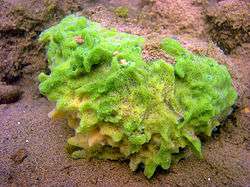Spongilla
| Spongilla | |
|---|---|
 | |
| Spongilla lacustris in the Hanford Reach of the Columbia River, Washington, USA. | |
| Scientific classification | |
| Kingdom: | Animalia |
| Phylum: | Porifera |
| Class: | Demospongiae |
| Order: | Haplosclerida |
| Family: | Spongillidae[1] |
| Genus: | Spongilla Lamarck, 1816[2] |
| Species | |
|
See text | |
Spongilla is a genus of freshwater sponges in the family Spongillidae found in lakes and slow streams. Sponges of the genus Spongilla attach themselves to rocks and logs and filter the water for various small aquatic organisms such as protozoans, bacteria, and other free-floating pond life. Unlike marine sponges, freshwater sponges are exposed to far more adverse and variable environmental conditions, so they have developed gemmules as a means of dormancy. When exposed to excessively cold or otherwise harsh situations, the sponges form these gemmules, which are highly resistant "buds" that can live dormant after the mother sponge has died. When conditions improve, the gemmules "germinate" and a new sponge is born.
Spongilla was used by John Hogg in the 19th century to attempt to justify a fourth kingdom of life.[3]
Species
- Spongilla alba Carter, 1849
- Spongilla arctica Annandale, 1915
- Spongilla aspinosa Potts, 1880
- Spongilla benguelensis Stephens, 1919
- Spongilla cenota Penney & Racek, 1968
- Spongilla chaohuensis Cheng, 1991
- Spongilla dawson Bowerbank, 1864
- Spongilla friabilis Lamarck, 1816
- Spongilla gutenbergiana Müller, Zahn & Maidhof, 1982
- Spongilla helvetica Annandale, 1909
- Spongilla inarmata Annandale, 1918
- Spongilla jiujiangensis Cheng, 1991
- Spongilla lacustris Linnaeus, 1759
- Spongilla mucronata Topsent, 1932
- Spongilla permixta Weltner, 1895
- Spongilla prespensis Hadzische, 1953
- Spongilla sarasinorum Weltner, 1901
- Spongilla shikaribensis Sasaki, 1934
- Spongilla stankovici Arndt, 1938
- Spongilla wagneri Potts, 1889
References
- ↑ van Soest, R. (2014). R. W. M. Van Soest, N. Boury-Esnault, J. N. A. Hooper, K. Rützler, N. J. de Voogd, B. Alvarez de Glasby, E. Hajdu, A. B. Pisera, R. Manconi, C. Schoenberg, D. Janussen, K. R. Tabachnick, M. Klautau, B. Picton, M. Kelly & J. Vacelet, eds. "Spongillidae Gray, 1867". World Porifera database. World Register of Marine Species. Retrieved 2014-05-22.
- ↑ van Soest, R. (2014). R. W. M. Van Soest, N. Boury-Esnault, J. N. A. Hooper, K. Rützler, N. J. de Voogd, B. Alvarez de Glasby, E. Hajdu, A. B. Pisera, R. Manconi, C. Schoenberg, D. Janussen, K. R. Tabachnick, M. Klautau, B. Picton, M. Kelly & J. Vacelet, eds. "Spongilla Lamarck, 1816". World Porifera database. World Register of Marine Species. Retrieved 2014-05-22.
- ↑ Hogg, John (1860), "On the distinctions of a plant and an animal and on a fourth kingdom of Nature", Edinb N Phil J (N Ser), 12: 216–225
- Myers, P., R. Espinosa, C. S. Parr, T. Jones, G. S. Hammond, and T. A. Dewey. 2006. The Animal Diversity Web (online). Accessed February 19, 2007 at http://animaldiversity.org.
- "freshwater sponge". Encyclopædia Britannica Online. Retrieved 2014-05-22.
- Protozoa and Invertebrates Manual. Burlington NC: Carolina Biological Supply Company. 1980. p. 15. ISBN 978-0892780365.
External links
| Wikimedia Commons has media related to Spongilla. |
| Wikispecies has information related to: Spongilla |
- Spongilla at the Encyclopedia of Life

- Integrated Taxonomica Information System (ITIS): Spongilla Lamarck, 1816 Taxonomic Serial No.: 47692
- National Center for Biotechnology Information (NCBI): Spongilla Taxonomy ID: 6054